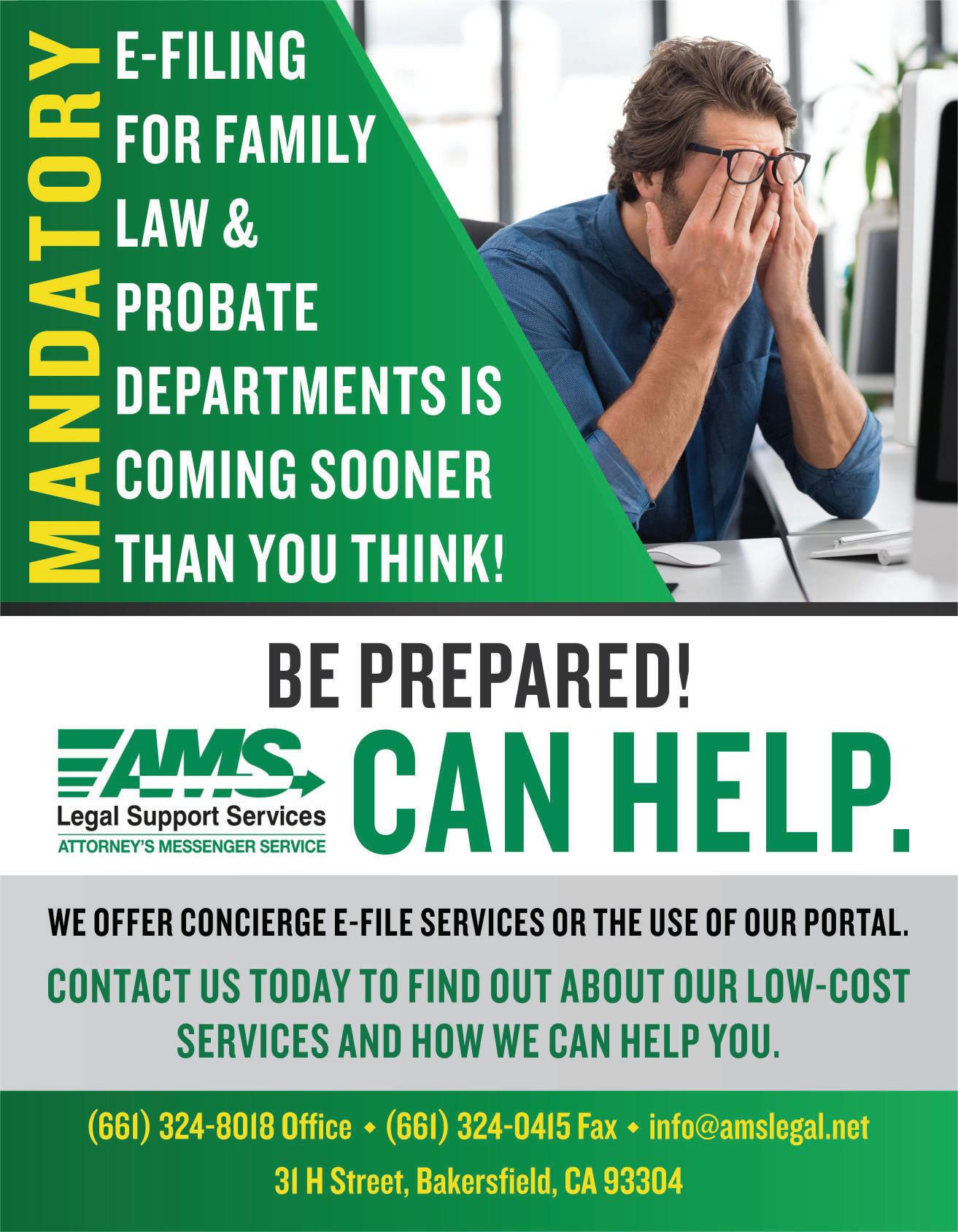
6 minute read
H. Dennis Beaver
22
SAFETY ON THE JOB UNDER COVID-19
by H. Dennis Beaver, Attorney at Law
LOCAL EMPLOYMENT It should be noted that the an LAW attorneys Dan employee cannot demand PPE Klingenberger and Jay that is not deemed appropriate for Roselieb answer frequently asked the exposure. questions in this coronavirus era. readers to send in workplace in my line of work, as I have to physical harm, including injury provide their workers with Klingenberger: Guidance from In late March, my column OSHA during the past few weeks Covid 19 - What Lawyers are recognizes that difference in Saying featured two Bakersfi eld protection apply to various Employment Law attorneys, Dan industries. The OSHA COVID-19 Klingenberger and Jay Rosenlieb, Guidance for Retail Workers who answered a number of provides tips for employers in questions about employee rights the retail industry--pharmacies, and obligations in this coronavirus supermarkets, and big box era. stores–“to help reduce your That story promoted many coronavirus.” These tips include: safety questions, which both “Allow workers to wear masks lawyers tackle head on: over their nose and mouth to DO WE HAVE A RIGHT TO virus.” OSHA likely chose the EMPLOYER PROVIDED GLOVES word allow rather than require, OR MASKS? as this likely refl ects several “Working at home is not an option considerations. deal with the public. My employer First, very few masks or face isn’t providing us with gloves or coverings would actually fi lter masks: We have to bring our out coronavirus. Masks and face own. Do Employees have a right coverings primarily serve the to be provided with protective purpose of avoiding spread by equipment on the job?” the person wearing the mask. Rosenlieb: The federal OSHA and perhaps gloves, may protect General Duty Clause requires that the customers, but would not an employer provide a workplace accomplish the objective of free from recognized hazards protecting the employee and, likely to cause death or serious therefore, do not have to be PPE. from infectious diseases such as Second, other practices–that COVID 19. OSHA-approved State we are constantly reminded Plans have similar, and in some of–may be far better served instances, even more protective to protect employees, such as standards. social distancing, frequent hand Employers are obligated to and disinfecting work areas. employees’ risk of exposure to the prevent them from spreading the Assuming that is true, masks, washing, not touching your face, personal protective equipment Finally, because of high demand, (PPE) needed to keep them safe. obtaining masks and gloves for
RES IPSA LOQUITUR
employees may be very diffi cult if not impossible.
MY EMPLOYER IS NOT TAKING THESE RISKS SERIOUSLY - MAY I SPEAK UP? “The company where I work, doesn’t seem to be taking this crisis seriously enough. There have been no real efforts made to ensure social distancing in the workplace, other than some signs and tape marks on the fl oor, which are not enforced. It doesn’t feel safe, but I fear retaliation if I speak up. What should I do?”
Rosenlieb: An employer is obligated to take such steps as are required by OSHA or an OSHA approved State Plan, not more. If the employer is fully compliant, an employee has little basis to demand further protection. In the event that the employer has policies in place which are not followed, the
Klingenberger: I agree. Often employees would like to see more done by an employer when the employer is actually fully compliant. Business owners and each of us as individuals are making decisions in a world of uncertainty. On a personal, local and national scale we are asking, “Have we done enough?”
There is strength in numbers. If some of your co-workers share your concerns, consider going to your employer with a colleague to express those concerns about safety in a professional manner. Offering ideas on solutions may help the conversation.
CAN I REFUSE TO WORK OVERTIME? “I’m in an industry where demand is currently skyrocketing, and workers are being pushed to the brink. Can I refuse to work overtime?”
Rosenlieb: No. There are, however, a couple of exceptions.
First, if a lack of sleep or fatigue creates demonstrable safety concerns, the employee may refuse to work if he or she has a good faith belief that the conditions create an imminent risk of serious injury or death.
Second, if the employee is part of a workplace covered by a collective bargaining agreement, the employee may be excused from working “mandatory” overtime.
Klingenberger: Jay’s answer is spot on. Unfortunately, we are in situation where some employees are working far more than they would like and others who would love to be back at work in any capacity.
This story fi rst appeared in Kiplinger.com on April 29th, 2020.
2020 SECTION LEADERSHIP
CRIMINAL DEFENSE SECTION Elliott Magnus, President Mai Shawwa, Vice President Timothy Hennessy, Treasurer Emily de Leon, Secretary Trustees: Jared Thompson, Elizabet Rodriguez, Monica Bermudez, Bo Koenig, Antonio Hutchison
ESTATE PLANNING AND PROBATE Kurt Van Sciver, President Stevie Jo McDonald, Secretary/Treasurer
WOMEN LAWYERS SECTION Stephanie Gutcher, President Tara Deal, Vice President Mayra Estrada, Treasurer Julia Vlahos, Secretary Directors: Leanne Wilder, Stephanie Bouey, Alisyn Palla, Vanessa Sanchez, Hon. Sharon Mettler, Ret.
YOUNG LAWYERS SECTION Lyndsi Andreas, Chair Victoria Harp, Secretary Angelo Villreal, Treasurer Tonya Anderson, Treasurer Elect James Bass, Director 1 Hunter Starr, Past Chair
IN-HOUSE COUNSEL Nicholas Ashley, President Melissa Frank, Vice President Michael Abril, Treasurer Alyssa Reed, Secretary
FAMILY LAW SECTION Diana Christian, President Jeffrey Travis, Vice President Edward Thomas, Treasurer Anthony Azemika, Secretary Keith Cramer, DCSS Representative Board Members: Nicholas P. Azemika, Stephanie Childers, Jeremy Swanson, Fred McAtee, Gerald Oldfi eld
MULTI-CULTURAL BAR ALLIANCE Kate Iwanami and Cynthia Loo, Co-Chairs Carol Bracy and Michael Cavas, Co-Vice Chairs Monique Galvan, Secretary Esther Schlareth, Treasurer Maria Contreras, Student Representative
24 Charitable Foundation Charitable Foundation Seeks Photos for Seeks Photos for Second Notecard Series Second Notecard Series
The Kern County Bar Association Charitable Foundation announces a new project–a second series of notecards with photographs of interest to the local legal community.
Our fi rst notecard series featured the art of Bill Means portraying historical Kern County Courthouses. These notecards (pictured on the next page) are still available for purchase at the KCBA offi ce, at a cost of $20. The notecard series operates as a fundraiser for the Foundation’s charitable giving, which includes the donation of books to local schools to celebrate Constitution Day, donations to the local Mock Trial and We The People champions, the Arthur E. Wallace Memorial Scholarship, Get on the Bus, and other worthy projects. The notecards are perfect for correspondence, and they help fund these important projects.
For this second series, we are soliciting photographs–of local courthouses, local places of note, or a subject you think would be of interest–taken by local members of the legal community, with all rights to use the photographs donated to the Foundation. No persons should be depicted in any of the photographs submitted. Five photographs will be chosen by the Foundation’s Board of Directors to adorn the notecards, and the photographer will be credited on the back of each card.
You may submit your photographs to the Foundation via e-mail to bthomson@kernbar. org. Use the subject line “CF Notecard Photo Submission.” The deadline for submissions is November 30, 2020.













